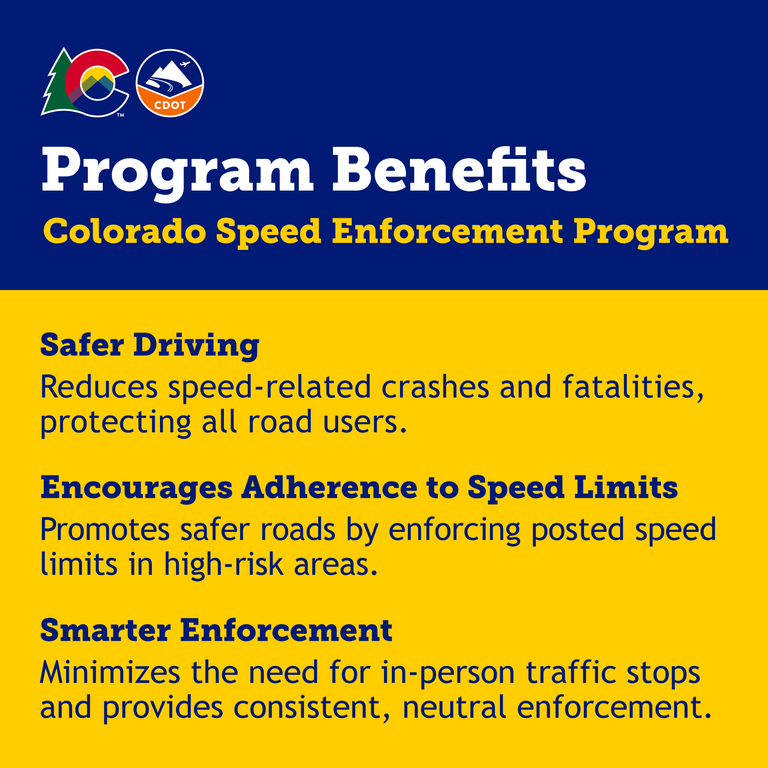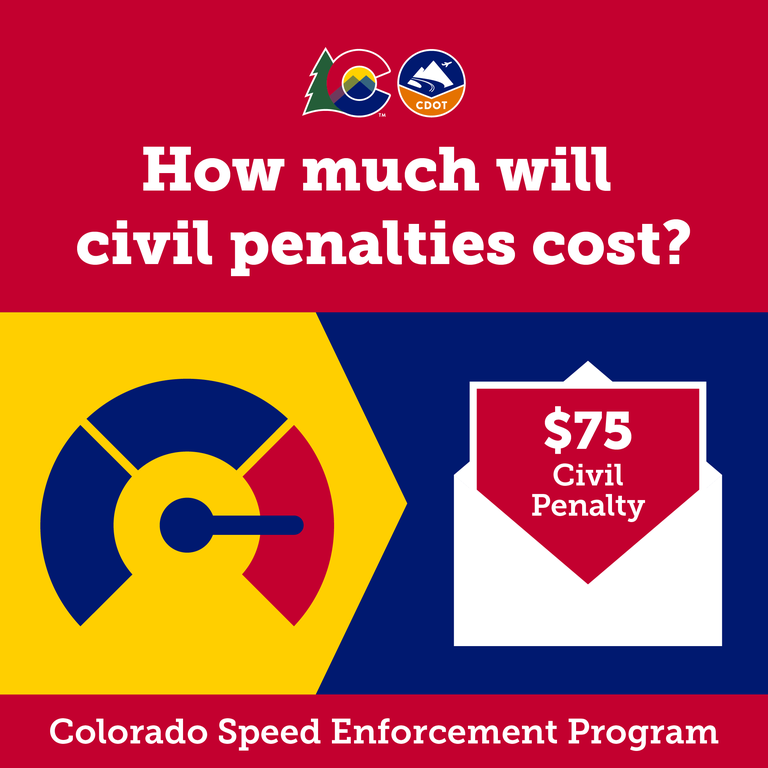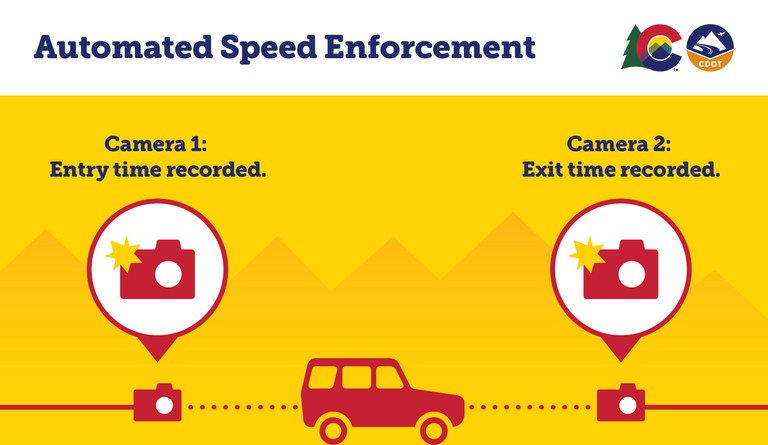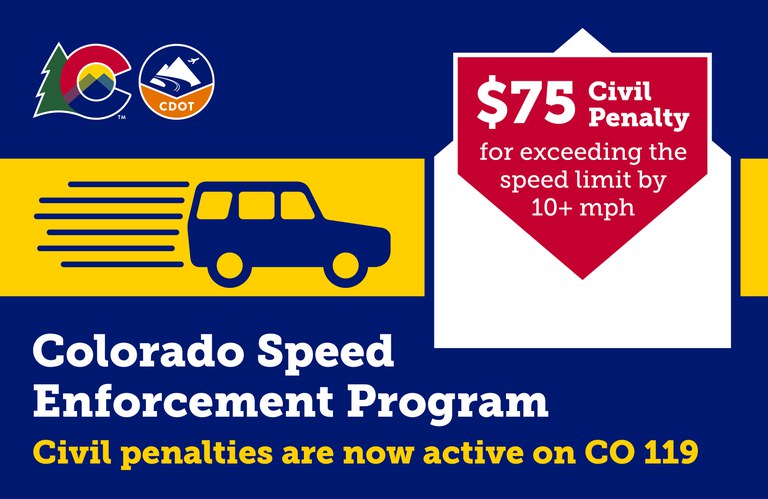Frequently Asked Questions
Colorado Speed Enforcement Program Information
What is the Colorado Speed Enforcement Program?
The Colorado Speed Enforcement Program is a new camera-based speed enforcement program that utilizes automated vehicle identification systems (AVIS). The program aims to improve safety for all roadway users, including drivers, road workers and law enforcement by managing speeds and reducing speed-related crashes on state highways. AVIS is deployed in designated corridors, school zones and work zones along high-risk corridors where speeding is a concern, encouraging safer driving and aiming to protect everyone on the road. AVIS refers to any system that uses machines (including camera technology) to automatically detect and capture speeding violations.
Why is this program being implemented?
The program aims to improve driver behavior and enforce adherence to posted speed limits to reduce crashes and fatalities in work zones, school zones and other high-risk corridors. Preliminary data shows that in 2024, Colorado had 1,366 work zone crashes, resulting in 508 injuries and 31 fatalities — up from 16 deaths in 2023 and 10 in 2022. Of those fatalities, 20 took place on highways. Nationally, work zones saw 96,000 crashes and 891 fatalities in 2022. By enforcing consistent and neutral enforcement, the goal is to encourage safer driving in high-risk areas and protect more people from serious crashes, injuries and death.

What legislation supports the use of speed safety cameras in Colorado?
In 2023, the Colorado General Assembly passed Senate Bill 24-195, codified in Section 42-4-110.5, C.R.S., which expanded roadway enforcement to include AVIS. This statute allows state and local agencies to use camera technology to enforce speed compliance on designated highway corridors.
How will I know if I am in a work zone, school zone or corridor with speed enforcement?
Motorists will see posted signage that clearly indicates the active use of speed safety cameras before entering the work zone, school zone or designated corridor. Signage will be placed no less than 300 feet before a such work zone, school zone or designated corridor and 300 feet before an active camera within the corridor to notify drivers.
Can I get a civil penalty for driving through a work zone even if I don’t see work taking place?
Yes. Civil penalties may be issued for speeding through a work zone that is part of the Colorado Speed Enforcement Program, even if work is not actively taking place. The nature of a work zone with adjusted lane configurations, construction equipment and uneven surfaces increases the likelihood of an excessive speed-related crash. Posted speed limits should be adhered to even if you cannot actively see on-site workers and/or work zone activity.
Is there a warning period before civil penalties are issued?
Colorado law requires public notification at least 30 days before a speed safety camera becomes active. Following public notice, drivers will receive warnings, not civil penalties, for at least another 30 days. Information about corridors where the Colorado Speed Enforcement program is active will be available on this website.
How are the speed enforcement sites selected?
Enforcement sites are selected based on crash and speed data indicating high-risk corridors. Sites may also be chosen based on the viability of traditional in-person law enforcement in the corridor.
Civil Penalty/Fine/Late Payment Information
How long does it take to get a notice of violation in the mail? What is the fine?
Notices of Violation are sent out within 30 days of the violation occurring where the vehicle involved is registered in the state of Colorado, or 60 days for vehicles registered outside of Colorado. The civil penalty for speeding in a work or school zone is $75. The civil penalty for speeding in designated AVIS Corridors is $40.
Are points assessed against my driver’s license?
These civil penalties are considered civil violations. Drivers do not receive points on their licenses for civil penalties issued by an automated speed enforcement system.

What if I wasn’t driving my car at the time of the violation? Am I still responsible for paying the fine?
As specified in Colorado Revised Statute 42-4-110.5, the registered owner of the vehicle remains liable for payment of the civil penalty even if the registered owner was not driving the motor vehicle at the time of the violation. The registered owner may obtain payment from the lessor or renter of the motor vehicle and forward the payment to the state. If the vehicle was stolen or recently sold, you can file a dispute.
How do I pay the fine?
Additional details about how to pay a fine are available at coloradospeedenforcement.com.
What if I don’t pay the fine by the due date on the notice of violation?
If a fine is not paid or the violation is not disputed within 45 days of the original notice of violation, the registered owner is given a civil penalty assessment:
- The civil penalty assessment must be paid within 30 days
- If this is not paid, a final order of liability will be issued
Speed Safety Camera Technology
How do speed safety cameras capture speeding through the work zone?
Speed safety cameras are placed at least a quarter to a half-mile apart in the work zone. When a vehicle passes each camera, an image and a timestamp (including the vehicle’s license plate number) are captured. The system then calculates the average rate of speed between each camera by dividing the distance by the travel time. Vehicles traveling an average of 10 mph or more above the posted speed limit are issued a civil penalty.


